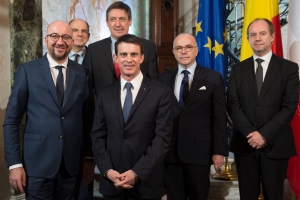Joint French-Belgian declaration of 1st February 2016: "Consolidating the French-Belgian partnership in counter-terrorism"
Meeting today in Brussels following an invitation from Belgium, the Prime Ministers of the Republic of France and the Kingdom of Belgium, Manuel Valls and Charles Michel, in the presence of their Interior Ministers, Bernard Cazeneuve and Jan Jambon, and their Ministers of Justice, Jean-Jacques Urvoas and Koen Geens welcomed the deep friendship between France and Belgium, as well as the excellent cooperation between our two countries in terms of internal security and counter-terrorism.
Faced with a context of renewed and worsening terrorist threats to our two countries, namely following the attack against the Jewish Museum in Brussels in May 2014, and the attacks in Paris in January and November 2015, the two Prime Ministers decided to further intensify cooperation between our two countries, in order to fight against terrorism with resolve, so as to overwin.
To this end, the two governments have decided upon the following measures:
- Police and intelligence cooperation
Following the attacks that deeply affected Belgium in 2014, and France in 2015, the two countries reaffirm their intention to pursue and intensify their police cooperation, by strengthening temporary exchanges between members of the police forces.
France and Belgium are concerned about preventing, detecting and improving the fight against the violence that some radicalised individuals seek to commit on the territory of one of the two countries or against one of the other countries of the European Union. They are determined to make full use of existing bilateral and European tools and intensify information exchange between their services.
Conscious of the need to better use the possibilities offered by the Schengen Information System (SIS), the two countries are making the joint commitment to systematically supply all data of a legal nature or on intelligence issues to SIS that is related to individuals likely to represent a terrorist threat.
Convinced of the operational added value that Europol's Focal Point (FP) Travellers brings, the two parties are committed to systematically providing input for this work file. Europol's creation of a new centre for the fight against terrorism is aimed at substantially improving exchanges of information within Europe.
The two countries also highlighted the importance of rapidly ensuring the interoperability of the European information systems (SIS, VIS, etc.), with the aim of strengthening the efficiency of security checks, namely at the borders.
To underscore the importance of the power to detect individuals with falsified, counterfeit and stolen travel documents, in particular at the external borders, the two parties agree upon the need to supply information on lost or stolen documents to Interpol's SLTD database.
To underscore the importance they attach to the Schengen acquis, which sanctions the principle of free movement in an area with enhanced security, and with the wish of taking full advantage of the provisions of the Tournai II Agreements, the two parties call for the full use of tools for police and judicial cooperation set up within the European Union. They are committed to deepening their cooperation, including cross-border cooperation, having the capacity to detect and prevent the movements of individuals representing a security threat, by implementing joint control operations on the roads and railroads.
The two parties agree to work together on optimising existing cross-border tools that could prove relevant in the fight against terrorism, especially the functioning of the Centre of Police and Customs Cooperation (CCPD), the joint radio frequencies and the LAPI/ANPR systems, as well as the issue of cross-border prosecutions.
France and Belgium will be actively pursuing consultations with the Netherlands and Germany regarding the strengthening security on the trains and stations of the Thalys network.
In terms of cooperation between the intelligence services, France and Belgium confirm good bilateral cooperation and will continue to support efforts to optimise the exchange and sharing of information among European intelligence services involved in the issue, through adequate tools.
- Judicial cooperation
Both countries undertake to work actively towards further strengthening their judicial cooperation.
Convinced of the operational usefulness of the joint French-Belgian investigation teams, including the joint investigation team set up following the attacks of 13 November 2015 in Paris. This team fully proved its importance and achieved very good results, so the two countries intend to intensify it in order to enable the identification and arrest of perpetrators of acts of terrorism operating on their territories.
Sharing the desire to strengthen an already particularly close and efficient judicial cooperation, the French Ministry of Justice also announced the creation of the position of a liaison magistrate in Belgium. Acting as an interface between the two countries' judicial authorities and their respective Ministries of Justice, the magistrate will be tasked with further improving the efficiency of the cooperation, deepening understanding of their legal and judicial systems, and improving the proven effectiveness of the channels of institutional relations.
In addition, in order to facilitate our judicial cooperation and adapting the penal response to the evolving threat, the two Ministers of Justice will be kept informed of the important legislative developments in this field, in particular with regard to substantive criminal law and criminal procedure. France and Belgium also want to work together to promote, within the European institutions, the need for the broadest possible harmonisation of the rules of law strengthening the effectiveness of investigations and enabling the prosecution and trial of perpetrators of acts of terrorism before the courts of EU Member States.
Similarly, the countries will promote joint positions on cooperation with the main internet and telephone service providers, as well as on the harmonisation of European legislation in this field. The magistrates and the investigators are increasingly faced with difficulties in accessing communication data. The encryption methods are ever more complex and damaging with regard to the identification and arrest of the perpetrators of acts of terrorism. In fact, cooperation with internet service providers, whose headquarters are often based abroad, must be improved in order to make it possible to quickly obtain information on the necessary communications in investigations. The two countries will inform each other about existing and upcoming legislation, and about the status of their cooperation with the main service providers.
- Fight against radicalisation
In view of a constantly evolving terrorist threat, our two countries are committed to strengthen their cooperation to ensure the security of their fellow citizens and to counter violent extremism.
The two parties are concerned about the respect of freedom of expression and respect for fundamental liberties. They affirm that the abusive and misappropriated use of the internet in order to spread messages of hate and violence needs to be resolutely combated. Belgium and France are committed to creating the most favourable conditions for their services to be able to exchange transparently in this area.
Highlighting the work started at the European level on establishing a dialogue with the big internet operators, the two parties call for commitments and concrete results in regards to detection and removal of illicit content.
France and Belgium are committed to working together to put in place joint communication strategies aimed at thwarting terrorist discourse, including through the full use of the resources made available within the SSCAT (Syrian Strategic Communication Advisory Team). They also undertake to collectively develop and improve their national strategies to fight against the phenomena of radicalisation, including by using the exchanges implemented at European level within the RAN (Radicalisation Awareness Network).
All actions aimed at promoting tolerance, non-discrimination, fundamental freedoms and solidarity will be considered.
Belgium and France will elaborate joint projects that could be financed by European institutions.
- Dialogue at European level
In the area of "Justice and Home Affairs", the two parties commit to continually look for convergent positions.
Noting that consistent efforts are already being made in Europe, but that these are not sufficient, our two countries commit, alongside the European Commission, to strengthen the operational and judicial measures permitting the identification and monitoring of the movements of people representing a threat to the security of our states and our fellow citizens, and who are crossing or have crossed the external borders of the European Union.
Welcoming the agreement reached on the directive related to the European PNR, the two parties commit to developing their national measures as quickly as possible, and ensuring they are implemented rapidly in all the Member States, including, as they agreed to within the Council, on intra-EU flights and charter flights. The two countries request that regular monitoring of the implementation be set up at European level. Reaffirming their desire to improve the flow of border passages, their respect for the fundamental freedoms and their strong demands to reinforce security, the two parties again confirm the need to rapidly adopt the proposed amendment of Article 7-2 of the Schengen Borders Code, in particular to establish systematic and mandatory control of the external borders, including of people who enjoy free movement. The two parties commit to support the propositions of the European Commission related to setting up an "entry and exit" system, and the deployment of the "smart borders" project, which will also need to apply to those who enjoy free movement.
Regarding arms trafficking, we are determined to work ever more closely with the European Parliament and all of our partners to find a rapid agreement on the revision of Directive 91/477 related to firearms, in order to extend the directive's scope to blank and neutralised arms, to improve the traceability of arms in the European territory, to adopt a joint marking system, and to strengthen the control of online arms sales.
Acting on the priorities at EU level regarding judicial cooperation, France and Belgium consider that it is indispensable to:
- make rapid progress in the harmonisation of indicting suspected terrorists, on the basis of a newly proposed EU directive,
- establish close dialogue among Member States to improve cross-border access to internet communication data in targeted investigations, including through better cooperation with internet service providers and with the United States;
- permit an increased recourse to joint investigation teams.
We will also work together to reinforce the controls at the European Union’s external borders. We support the rapid adoption of the Commission's proposal to set up a European Border and Coast Guard Agency. France and Belgium are fully committed to this cause by contributing a permanent pool of border guards and coast guards available that would have broader powers.
In addition, in line with the cooperation that we have established in the framework of controlling our shared borders, we reiterate our determination to proceed with the removal of foreigners who represent a threat to public order and to our fellow citizens, in line with EU law and bilateral agreements that we have concluded. Furthermore, Belgium and France will continue to have regular exchanges of information on migratory movements around and towards their cross-border zone.
Finally, we are awaiting with the utmost interest the action plan on the fight against the funding of terrorism that the Commission is due to adopt, and, on this basis, we call for accelerated efforts and work in this area.


